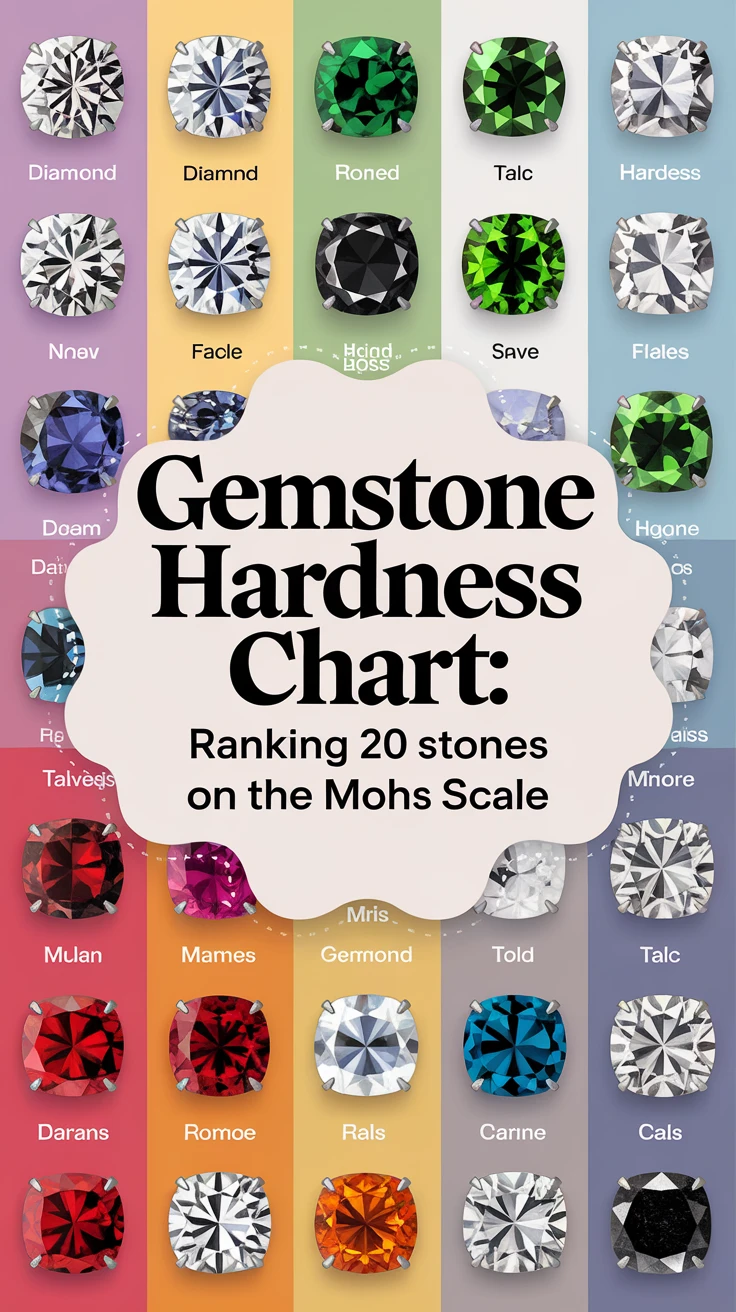
When it comes to selecting and caring for gemstones, understanding their hardness is crucial. Whether you’re a jewelry enthusiast, collector, or simply someone who wants to make informed decisions about gemstone purchases, knowing where different stones fall on the Mohs hardness scale can make all the difference. This comprehensive guide will walk you through 20 popular gemstones and their rankings on the Mohs scale, helping you make better decisions about your gemstone investments and care routines.
Understanding the Mohs Hardness Scale
The Mohs scale, developed by German mineralogist Friedrich Mohs in 1812, is a relative scale that measures the scratch resistance of minerals. The scale ranges from 1 (softest) to 10 (hardest), with each number representing a mineral’s ability to scratch softer materials while being scratched by harder ones.
The Reference Minerals
| Mohs Hardness | Reference Mineral | Common Comparison |
|---|---|---|
| 1 | Talc | Baby Powder |
| 2 | Gypsum | Fingernail |
| 3 | Calcite | Copper Penny |
| 4 | Fluorite | Iron Nail |
| 5 | Apatite | Glass |
| 6 | Orthoclase | Steel File |
| 7 | Quartz | Window Glass |
| 8 | Topaz | Hardened Steel |
| 9 | Corundum | Ruby/Sapphire |
| 10 | Diamond | Diamond |
20 Gemstones Ranked by Hardness
Very Hard Gemstones (8.5-10)
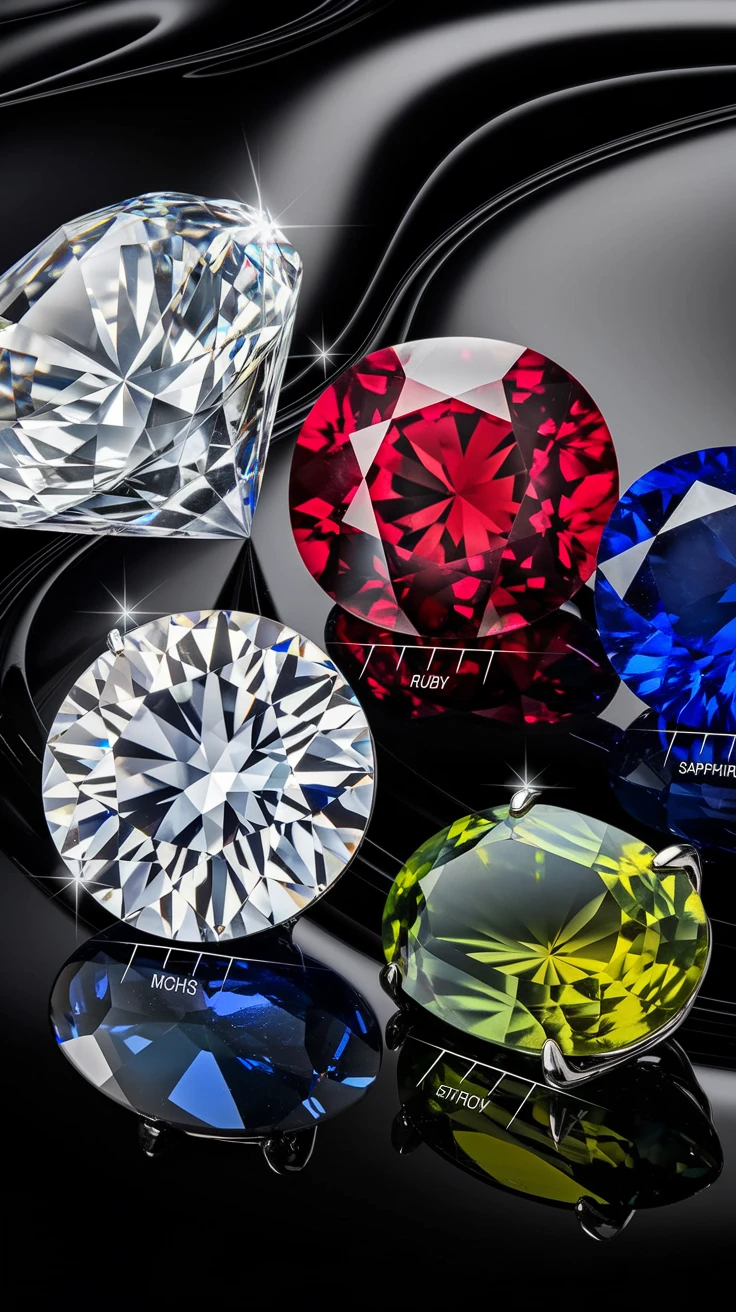
These gemstones rank at the top of the Mohs hardness scale and are the most durable options for jewelry. Their resistance to scratches makes them ideal for everyday wear. However, despite their hardness, some of these stones can still chip if struck with enough force.
| Gemstone | Key Features |
|---|---|
| Diamond (10) | Virtually impossible to scratch, ideal for engagement rings, available in various colors. |
| Ruby and Sapphire (9) | Extremely durable, suitable for all jewelry types, available in every color (sapphire). |
| Chrysoberyl (8.5) | Highly durable, includes cat?s eye effect, excellent brilliance. |

View on Amazon
As an Amazon Associate, I earn from qualifying purchases.

View on Amazon
As an Amazon Associate, I earn from qualifying purchases.
Pro tip: Even though these gems are very hard, they can still chip if struck at the right angle. Store them carefully.
Hard Gemstones (7-8)
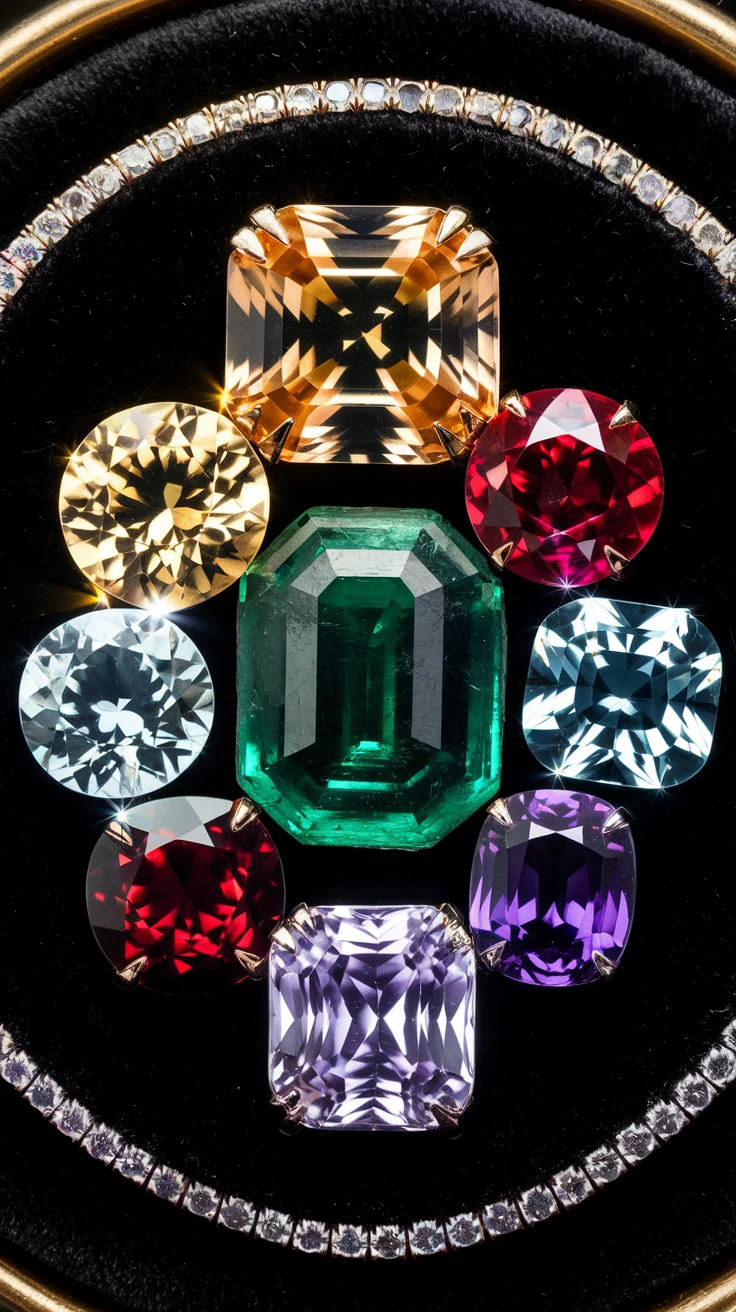
These gemstones are highly durable and offer a wide variety of colors and styles. They are perfect for rings, bracelets, and other frequently worn jewelry. While not as hard as diamonds, they still offer excellent scratch resistance.
| Gemstone | Key Features |
|---|---|
| Topaz (8) | Excellent for daily wear, wide color range, perfect for statement pieces. |
| Spinel (8) | Often mistaken for ruby, bright colors, excellent durability. |
| Emerald & Aquamarine (7.5) | Classic green and blue hues, historical significance, requires some care. |
| Garnet & Amethyst (7) | Vibrant colors, widely available, good durability. |

View on Amazon
As an Amazon Associate, I earn from qualifying purchases.

View on Amazon
As an Amazon Associate, I earn from qualifying purchases.
Pro tip: Some of these gemstones have natural inclusions that can make them fragile. Handle with care.
Medium Hard Gemstones (5-6.5)
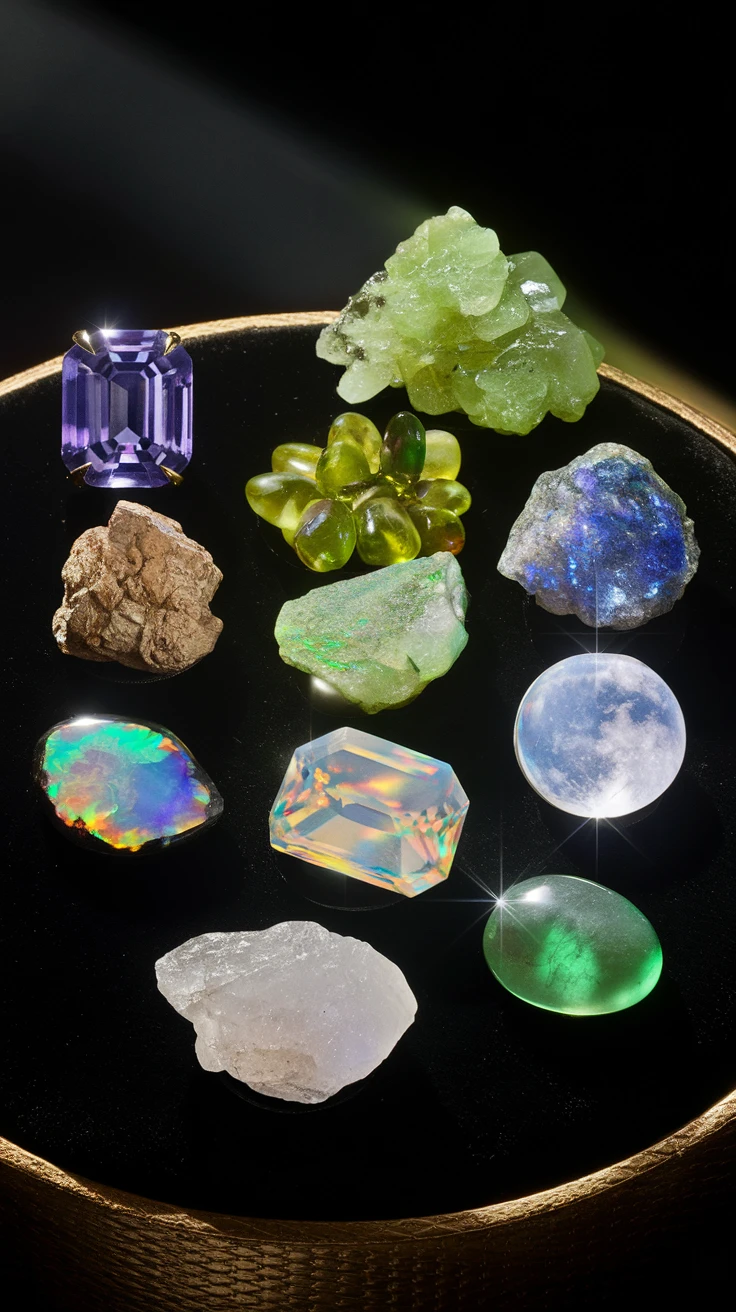
These stones offer a balance of durability and beauty but require more care to maintain their condition. Some have unique optical effects, such as opalescence or iridescence, making them stand out in jewelry.
| Gemstone | Key Features |
|---|---|
| Tanzanite (6.5) | Stunning blue-violet color, best for occasional wear, temperature sensitive. |
| Peridot & Iolite (6.5) | Bright olive-green (Peridot), deep blue-violet (Iolite), requires care. |
| Opal & Moonstone (6) | Unique optical effects, sensitive to temperature changes. |
| Jade (6) | Symbol of luck and protection, extremely tough despite moderate hardness. |

View on Amazon
As an Amazon Associate, I earn from qualifying purchases.

View on Amazon
As an Amazon Associate, I earn from qualifying purchases.
Pro tip: Avoid exposing these gemstones to harsh chemicals or extreme temperature changes.
Soft Gemstones (1-4.5)
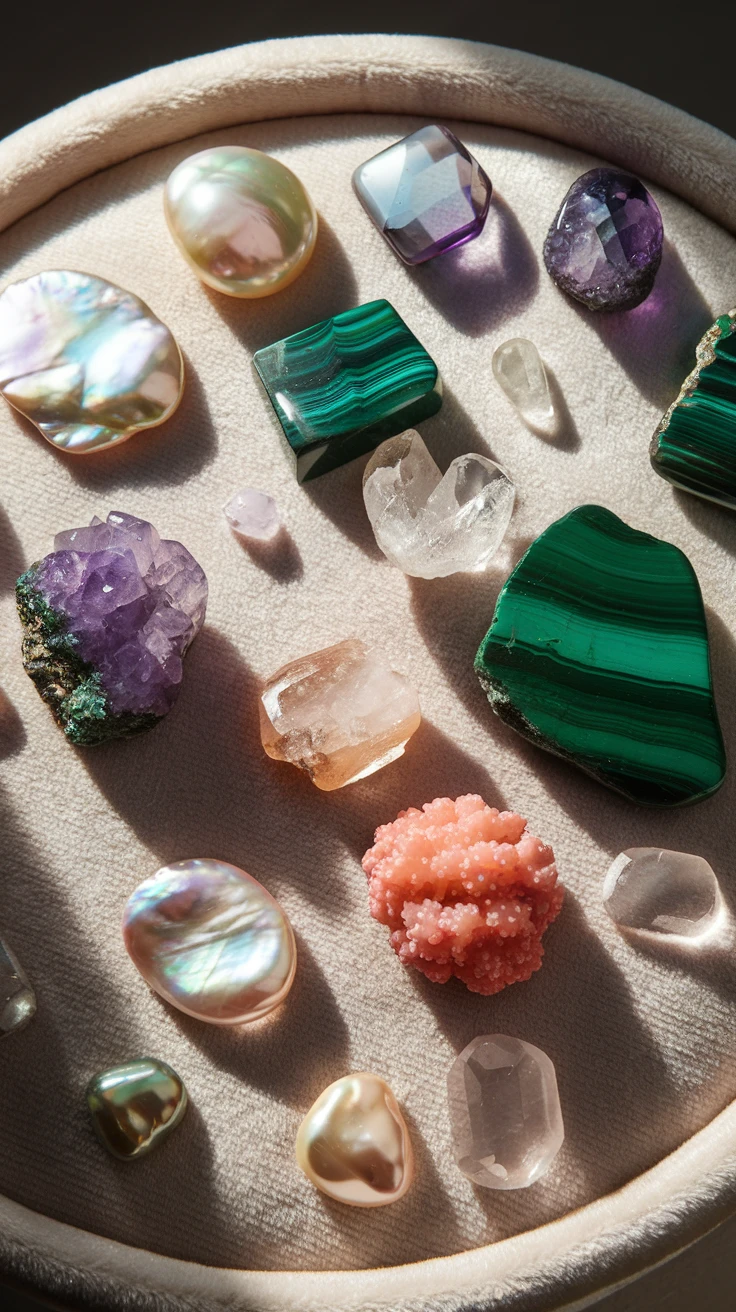
These gemstones are delicate and require special care when worn in jewelry. They are often prized for their beauty and rarity rather than their durability. Many of these stones are best suited for pendants or earrings rather than rings or bracelets.
| Gemstone | Key Features |
|---|---|
| Pearl (3.5-4) | Organic, sensitive to chemicals, improves with wear (natural oils). |
| Fluorite (4) | Highly fluorescent, delicate structure, used in carvings. |
| Malachite (4.5) | Vibrant green, requires careful handling, sensitive to acids. |
| Rhodochrosite (4) | Pink shades, used in jewelry, requires care. |
| Calcite (3) | Soft, transparent varieties available, easily scratched. |
| Coral (2.5-3) | Organic, used in antique jewelry, very delicate. |

View on Amazon
As an Amazon Associate, I earn from qualifying purchases.

View on Amazon
As an Amazon Associate, I earn from qualifying purchases.
Pro tip: Store these gemstones in soft cloth pouches to avoid scratches and exposure to harmful elements.
Conclusion
Understanding gemstone hardness is essential for both collectors and jewelry enthusiasts. By knowing where different stones rank on the Mohs scale, you can make informed decisions about purchases and properly care for your precious stones. Remember that hardness is just one factor in gemstone durability, but it’s a crucial one that should guide your choices in jewelry selection and care practices.
Key Takeaways
- Diamond is the hardest natural gemstone at 10 on the Mohs scale
- Harder gemstones (7+) are better suited for daily wear jewelry
- Storage and cleaning methods should be based on hardness levels
- Softer stones require more careful handling and specific care routines
Frequently Asked Questions
What is the Mohs hardness scale?
The Mohs hardness scale is a relative scale from 1-10 that measures a mineral’s resistance to scratching, with diamond being the hardest at 10.
Can a gemstone’s hardness change over time?
No, a gemstone’s inherent hardness doesn’t change, but its surface can become damaged or worn with improper care.
Why are some gemstones given a range of hardness values?
Some gemstones show varying hardness depending on the direction of testing or their crystal structure.
Is hardness the same as durability?
No, hardness is just one aspect of durability. Toughness and stability also play important roles in a gemstone’s overall durability.
Can I wear softer gemstones in rings?
While possible, it’s not recommended for daily wear as softer stones are more prone to scratching and damage.
How should I clean stones of different hardnesses?
Cleaning methods should be based on hardness levels, with harder stones tolerating more aggressive cleaning methods than softer ones.
Can I store different hardness gemstones together?
It’s best to store gemstones separately or group them by similar hardness to prevent scratching.
What’s the minimum hardness recommended for engagement rings?
For daily wear engagement rings, gemstones should have a minimum hardness of 7 on the Mohs scale.
How can I test a gemstone’s hardness?
Professional gemologists use standardized testing kits. Home testing is not recommended as it can damage the stone.
Does color affect a gemstone’s hardness?
No, color doesn’t affect hardness. Stones of the same mineral species have the same hardness regardless of color.


